Bubot Niyar est un film de genre Documentaire
Bubot Niyar (2006)

Si vous aimez ce film, faites-le savoir !
- Infos
- Casting
- Infos techniques
- Photos
- Vidéos
- Passages TV
- Citations
- Personnages
- Musique
- Récompenses
Durée 1h20
Genres Documentaire
Themes Religion, Sexualité, Homosexualité, Transsexuels et transgenres, Documentaire sur l'homosexualité, Documentaire sur la religion, Religion juive, LGBT, LGBT et la religion, LGBT
Note73%










Paper Dolls (Hebrew: בובות נייר, Bubot Niyar) is a 2006 documentary by Israeli director Tomer Heymann, which follows the lives of transgender migrant workers from the Philippines who work as health care providers for elderly Orthodox Jewish men and perform as drag queens during their spare time. It also delves into the lives of societal outcasts who search for freedom and acceptance.
In 2013, the story was adapted as a musical and produced at the Tricycle Theatre in London.
Commentaires
Postez un commentaire :
Suggestions de films similaires à Bubot Niyar
Il y a 8961 ayant les mêmes genres cinématographiques, 10287 films qui ont les mêmes thèmes (dont 0 films qui ont les mêmes 10 thèmes que Bubot Niyar), pour avoir au final 70 suggestions de films similaires.Si vous avez aimé Bubot Niyar, vous aimerez sûrement les films similaires suivants :
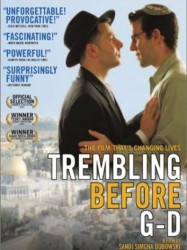 , 1h24
, 1h24Réalisé par Sandi Simcha DuBowski
Origine Israel
Genres Documentaire
Thèmes Religion, Sexualité, Bisexualité, Homosexualité, Documentaire sur l'homosexualité, Documentaire sur la religion, Religion juive, LGBT, LGBT et la religion, LGBT
Note69%





Le film traite des gays et des lesbiennes juifs orthodoxes qui cherchent à réconcilier leur foi et leur sexualité.

Say Amen (2005)
, 1h5Origine Israel
Genres Documentaire
Thèmes Religion, Sexualité, Homosexualité, Documentaire sur l'homosexualité, Documentaire sur la religion, Religion juive, LGBT, LGBT et la religion, LGBT
Note72%





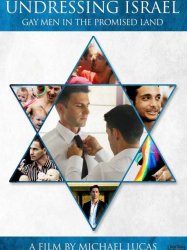 , 46minutes
, 46minutesRéalisé par Michael Lucas, Yariv Mozer
Origine Israel
Genres Documentaire
Thèmes Religion, Sexualité, Homosexualité, Documentaire sur l'homosexualité, Documentaire sur la religion, Religion juive, LGBT, LGBT et la religion, LGBT
Acteurs Eliad Cohen, Yehonathan (Yeho), Ivri Lider
Note67%





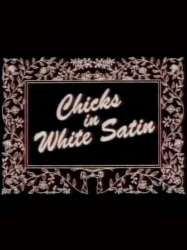
Chicks in White Satin (1994)
, 25minutesOrigine Etats-Unis
Genres Documentaire
Thèmes Religion, Sexualité, Homosexualité, Documentaire sur l'homosexualité, Documentaire sur une personnalité, Documentaire sur la religion, Religion juive, LGBT, LGBT et la religion, LGBT, Lesbianisme
Note66%





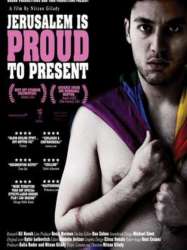
Origine Israel
Genres Documentaire
Thèmes Religion, Sexualité, Homosexualité, Documentaire sur l'homosexualité, Documentaire sur la religion, Religion juive, LGBT, LGBT et la religion, LGBT
Note74%





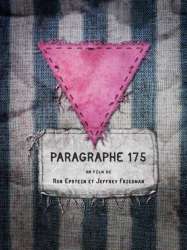
Paragraphe 175 (2000)
Réalisé par Rob Epstein, Jeffrey Friedman
Genres Documentaire, Historique
Thèmes Le racisme, Religion, Sexualité, Homosexualité, Documentaire sur la discrimination, Documentaire sur le droit, Documentaire sur la guerre, Documentaire historique, Documentaire sur l'homosexualité, Documentaire sur la religion, Politique, Religion juive, Documentaire sur la Seconde Guerre mondiale, LGBT, LGBT
Acteurs Rupert Everett
Note76%





Les homosexuels ont été comme tant d'autres les victimes du régime hitlérien. Ils étaient persécutés en vertu du paragraphe 175 du code pénal allemand. Ce paragraphe, datant de 1871, condamnait à la prison "les actes contre nature" entre hommes.

Fish out of Water (2009)
, 1hOrigine Etats-Unis
Genres Documentaire
Thèmes Religion, Sexualité, Homosexualité, Documentaire sur l'homosexualité, Documentaire sur la religion, LGBT, LGBT et la religion, LGBT
Note73%





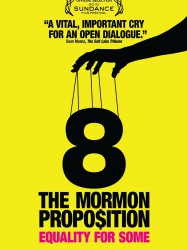
8: The Mormon Proposition (2010)
, 1h20Réalisé par Steven Greenstreet
Origine Etats-Unis
Genres Documentaire
Thèmes La famille, Religion, Sexualité, Homosexualité, Documentaire sur le droit, Documentaire sur l'homosexualité, Documentaire sur la religion, LGBT, Mariage homosexuel, LGBT et la religion, LGBT
Acteurs Dustin Lance Black
Note70%





Director Reed Cowan, who is a former Mormon missionary, "planned on making a film about gay teen homelessness and suicide in Utah, but switched his focus to Mormon ideology because of how it contributes to the homophobia that causes these problems". The film focuses on the wealth and power of the The Church of Jesus Christ of Latter-day Saints, and how the Church uses the National Organization for Marriage to advocate for denial of rights to lesbian, gay, bisexual, and transgender (LGBT) Americans. It states that LDS Church leader Thomas S. Monson asked to ensure the passage of the controversial California Proposition 8. It also states that many homeless people in Utah are LGBT teens who were abandoned by their Mormon parents.

Kidnapped for Christ (2014)
, 1h25Origine Etats-Unis
Genres Drame, Documentaire
Thèmes Religion, Sexualité, Homosexualité, Documentaire sur l'homosexualité, Documentaire sur la religion, LGBT, LGBT et la religion, LGBT
Note69%





The documentary details the experiences of several teenagers who were forcibly removed from their homes and sent to Escuela Caribe at their parents' behest. The film focuses on the plight of a Colorado high school student, David, sent to the school by his parents after he told them he was gay. The film also documents the experiences of two girls: Beth, who was sent to the school because of a "debilitating anxiety disorder", and Tai, who was sent for behavioral problems resulting from childhood trauma.
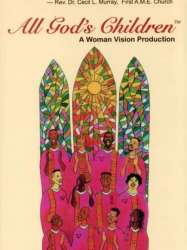
All God's Children (1996)
Origine Etats-Unis
Genres Documentaire
Thèmes Religion, Sexualité, Homosexualité, Documentaire sur l'homosexualité, Documentaire sur la religion, LGBT, LGBT et la religion, LGBT
 Connexion
Connexion